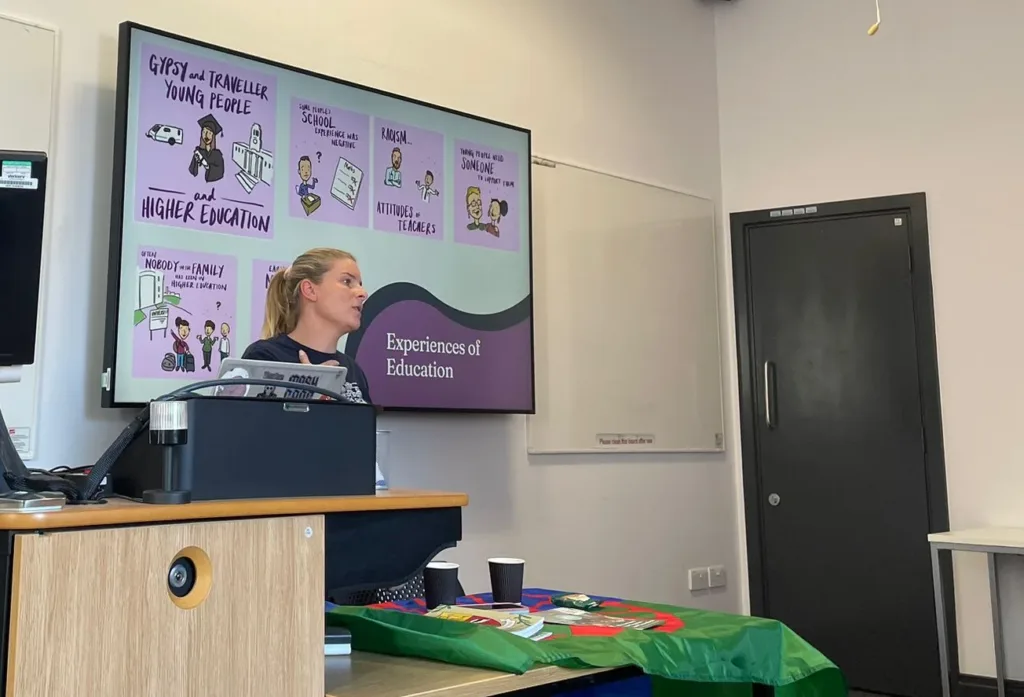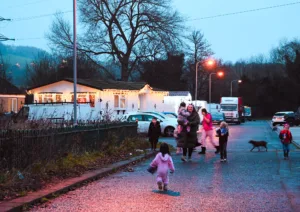University of Leeds working towards a more inclusive institution for Gypsy, Roma and Traveller communities
Charlotte Keyworth, Senior Student Success Officer University of Leeds

As part of the University of Leeds’s commitment to the GTRSB into HE Pledge, there has been a focus on raising awareness and educating our staff about Gypsy, Roma and Traveller communities.
Recognised as distinct ethnic groups, there is often little known or understood about the heritage and culture of Gypsy, Roma and Traveller (GRT) communities. People from GRT communities are likely to face significant barriers to accessing and succeeding within Higher Education and are the least likely to enter higher tariff education institutions, of any ethnic minority group.
We have a very small number of students at the institution who have identified as being from one of these communities, but it is recognised that there could be more who have not disclosed this when applying or registering.
As part of university’s commitment to build an inclusive learning, teaching and working environment for people from GTRSB communities, educating colleagues felt like a very important first step to ensure that:
a) There is awareness of the pledge and the university’s commitment amongst our staff body
b) Colleagues are understanding of these communities, the barriers that they may face within the HE system, and how to better support these students
c) We can continue to grow this work as colleagues can better advocate for our students, and staff, from these communities
June marks GRT History Month and this year, colleagues from across the institution joined our training session delivered by Roma Roots Community CIC.
The session was delivered by Daniela Mailat,who runs the organisation. Daniela was joined by her brother Albert; both are Roma and are heavily involved with work in the community- – between them they have served in the Police force and worked in schools advocating for the Roma community. Before coming to us here at Leeds, they have delivered training for West Yorkshire Police and the NHS.
They began the training by encouraging attendees to consider and challenge their own perceptions – and perhaps misconceptions – about the Roma community, before moving onto Roma history through the ages. The session concluded with attendees learning more about the practical actions they could consider to contribute towards a more inclusive environment for Roma students.
Feedback was positive, with one colleague commenting, ‘I learned so much (at this session) and went on to spend time with the Roma (community) at Glastonbury –
singing, dancing and attending talks. I am better informed and able to challenge people’s negative views.’
Last month, we were joined by Leeds Gypsy and Traveller Exchange (Leeds GATE), who delivered a session focused on the Gypsy and Traveller community. Leeds GATE have been working with Educational Engagement for a number of years and are a valued partner in our work towards the pledge. It was fantastic to have them join us for the morning and the session was very well received, with one colleague commenting ‘I would have loved a longer session to find out even more about the community – it feels like so much is unknown to the general population (about these communities).’
Throughout the session, the team at Leeds GATE took us back to the beginning, focusing on the history of Gypsies and Travellers and challenging common misconceptions. For example, contrary to common belief, only 3% of Gypsies and Travellers live roadside on authorised land, the rest living in mobile homes or ‘regular’ brick and mortar.
The session took a community asset focus – helping us to understand the values that these communities take forward into every aspect of their lives and where and how this may impact their education. Understanding more about the heritage and culture of Gypsies and Travellers allows us at the university to consider how we can make our practice and our environment more accessible to students studying with us or considering studying with us.
Across both of these sessions, all attendees who provided feedback agreed that they would recommend these sessions to their colleagues. We plan to organise further opportunities for colleagues who wish to find out more about these communities and in turn, develop their practice when working with a severely underrepresented group of students.
If you wish to get involved with any aspect of the university’s pledge commitments, please email Charlotte Keyworth (Student Success Centre, Educational Engagement) or Louise Crabtree (Access & Outreach, Educational Engagement). We have a working group made up of colleagues from a range of services and welcome new members. If you are currently undertaking any work or research in this area, please do also reach out, we would love to hear from you.


